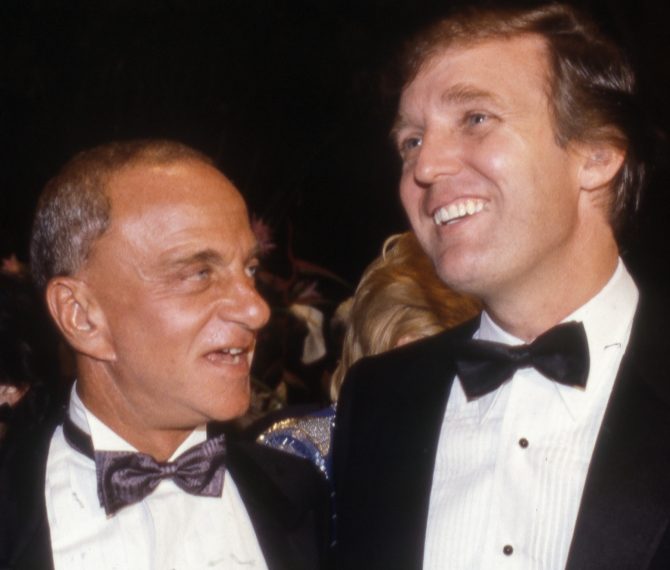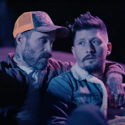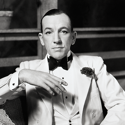
This article is part four of a series of interviews from Sundance Film Festival chronicling the best of indie film for the upcoming year.
Matt Tyrnauer is on a roll.
Having dominated 2018 with his documentaries Studio 54 about the eponymous nightclub and Scotty & the Secret History of Hollywood, which chronicled the life of Scotty Bowers, bisexual hooker/pimp to the stars, Tyrnauer has wasted no time dropping another bombshell, this time at the Sundance Film Festival.
Where’s My Roy Cohn? examines the life of one of America’s most elusive figures. Roy Cohn rose in prominence during the anti-Communist Red Scare as right-hand hatchet man of Joe McCarthy. Cohn then became a fixture of New York society, representing a series of organized crime figures while hobnobbing with the Republican Party, becoming close friends with Richard Nixon, Ronald Reagan, and even the “trysexual” con man Roger Stone.
How about we take this to the next level?
Our newsletter is like a refreshing cocktail (or mocktail) of LGBTQ+ entertainment and pop culture, served up with a side of eye-candy.
Back in New York, Cohn also mentored a young real estate developer named Donald Trump before his death in 1986 from AIDS.
We joined Matt Tyrnauer for lunch just after the Sundance premiere of his new film. Perched high above Park City, UT at an alpine-style ski lodge, we sipped drinks and chatted about his latest film.
Where’s My Roy Cohn? has been acquired by Sony Pictures Classics. (Release date pending.)
The response to the film has been overwhelmingly positive. Reviews, word of mouth. How are you feeling right now?
Great. The response has been overwhelming, and that goes for press and word of mouth, and for distributors too. It’s been almost two years making the film. It’s a political film that has very topical themes. Because political news is so voluminous and ever-shifting right now, it was never clear to me what the political world would be when the movie was brought to the public for the first time. It happened to land on the day that Roger Stone was arrested.
When we talked about Scotty and the Secret History of Hollywood, you mentioned you were working on this. At what point did you decide to try and crack Roy Cohn? What made you want to do a film about him?
I’ve known about him because I’m interested in politics. I think if you’re Jewish, you hear about him from grandparents and parents. At least in my family, he came up, but never in any detail. I mean, being Jewish and gay and of a certain vintage, you would have heard about him from Angels in America in its different permutations from Broadway play to Mike Nichols adaptation to revival. But, I believe Cohn would have been a footnote in American history until the 2016 election. Then he became our modern Machiavelli. That delayed emergence of him as a figure of immortal, worldwide political importance I found fascinating. That’s why I wanted to make the movie.

You feature Roger Stone on the day of his arrest, which is amazing. Was he or anyone else reluctant to talk about Roy? He had so many shady deals.
Certain people were reluctant to speak but certainly not Roger Stone. Think whatever you do of Roger Stone; he’s somebody that’s obsessively interested in politics. Roy Cohn, I think, is one of the most interesting stories of our time. So I would imagine Roger Stone would be interested much in the same way that anyone else would want to contextualize and make sense of the legacy of Cohn, which really changed. I don’t think that happens that much. 40 years after someone’s death they become instantly re-contextualized and exponentially more important than they had been for the previous generation.
Obviously, Roy had a complicated relationship with his family, and it’s surprising that you got to any of them. It’s interesting the way they speak of him—there are flickers of affection, but they, maybe better than anyone else know exactly who he was. Do you think they seem him as a good person? As a monster?
We spoke to three family members on camera. Two of the three have a very formed, longstanding opinion of their cousin as an irredeemable monster, or as one of them says, “An evil that came from certain parts of the American culture.” The third cousin we spoke to had a more mixed opinion of him, and I believe, had a kind of catharsis while we were interviewing him. He hadn’t read literature on Roy Cohn. He knew him and liked him, and Roy was helpful to him. After hearing my questions and having me explain my motivations for the questions, he went and did a lot of research and asked to be interviewed again so he could denounce his cousin on camera, and make a public statement about his new feelings. So that was interesting.
I had never seen a lot of the archive footage you use, including the Rosenberg protests. I’d read of them, but never seen them because nobody talks about the protests.
I’d never seen that footage either until it came in. We did—I think it’s no surprise—I do a deep dive into archival footage, and it’s very important to me to have the best of the best, things that aren’t usual. This was a big surprise. It came in; it’s color footage of the protests in the streets of New York City in the weeks leading up to and on the day of the execution. There’s a riot that’s in color—and remember, this was the 40s. I was bowled over by that footage in a way that I’ve never been bowled over by archival. I find it very emotionally moving to see. I had no idea that it took place. It’s one of those things that makes you ask yourself, what is it about the United States of Amnesia that we’re not taught these things in schools? I think this footage should be famous around the world. Everyone should know that footage. I expanded the sequence to accommodate it. I find it devastating. In its unedited form, it will make you cry. You can see just how deeply upsetting this was to the population at large, and especially the Jewish population. It’s one part of the film that I, having seen the film more than anyone else, still respond to.
Did you ever make an effort to get in touch with the Rosenberg family? Their sons are still alive.
I made different choices. I wanted to make a film that was a political film and, in a way, a political mystery and thriller.

You do talk to people and confirm Roy’s prosecutorial misconduct, which should have granted the Rosenbergs a new trial, whether you believe they were guilty or innocent.
Ethel was never proven guilty. There’s no proof that Ethel was guilty. The death sentence was beyond overreach. That was important for me to show. It’s a 90-minute film, so more to your question, if I had been doing a 4-part series I would have gone into more depth. But really, you’re looking at the entire resume of the Dark Apostle of political malfeasance. And this is an early chapter.
It is frightening that he did that at such a young age. So, Roy, it’s now been established, was gay and died of AIDS. I guess some people even disputed that when Angels in America came out. I didn’t know he had a longtime boyfriend. How did you get to Roy’s boyfriend Wallace Adams? Was he reluctant to talk?
My understanding is that Roy had several long term relationships, and maybe scores of short term relationships. In other words, that might be the most normal thing about him as a gay man.
Related: Seven Gay (Or Gay-ish) Men Who Helped Unleash Awful Donald Trump On The World
[Laughter]
We had heard of this gentleman, and we pursued him for an interview, and he was someone that had to be persuaded to appear on camera.
What surprised you the most about what he told you?
Well, like everyone who said they liked Roy, I found that surprising. There were people that liked him. He is characterized by his more intellectual friends who are liberal members in good standing of the New York power grid as a lovable monster, which is how I think they justify their affection for him. I never met him, obviously. My impression from having spoken to dozens of people who knew him well is that he could be very charismatic and fun to be around. You would obviously have to look the other way and find some way to excuse the unforgivable misdeeds that he was guilty of. And I don’t really understand that. I don’t understand palling around with someone that has blood on their hands like that. Even if you think they’re fun, I could see saying hi at a cocktail party and then getting off on it, because that’s New York.
And Washington.
And LA. It’s really everywhere. It’s just so magnified in cities where media is the major enterprise. So “lovable scoundrel” was what people said. I think that comes across in the film, and I think you get that in Angels in America too. So he’s a great character for that aspect.
He was certainly extraordinarily media savvy. It’s interesting: He does something in all that archival footage that you show. Occasionally we catch him looking straight into the camera as he’s answering an interviewer. Trump does the same thing. What’s that about? Is that narcissism?
I think it’s a skill. They know what they’re doing, they’re performers. Trump’s a performer. Cohn was a performer and Trump, I believe, learned everything he knows about performing from Roy Cohn.
When you were talking to Wallace, he tells a story about putting his coat on and the pockets are filled with $100 bills. Roy obviously loved dealing. That’s the whole essence of his life. That’s how he was born.
From a transaction.
Yes. Do you think he was capable of understanding real human affection?
I personally can’t tell for sure. What’s your definition?
Non-sociopathic, non-transactional affection.
Probably not.
Did Wallace love him?
He might have. I can’t remember if I asked him. It’s been so many years. I think he did have real, deep affection for him and thought that he was lovely. I think that Wallace Adams, the one occasion I met him, had a highly developed sense of the New York merry-go-round. He was born into that class where you’re playing “the game.” Part of Roy Cohn’s life touched that world, and Wallace Adams was a player in that world. I think he had a deep affection for Roy Cohn, but because he’s from a WASP-y family, Wallace was rebelling, not just by being gay, but by being with a character his family thought was beneath him. I think he felt like he was in two worlds, and was excited by it.

Now, we know J. Edger Hoover was also gay. There were rumors about Joe McCarthy. Did they know Roy was also gay?
I don’t know. I would imagine Hoover would know because he had dossiers and spies. It would be very interesting to find out what Hoover did know about Roy’s sexuality, and to have been a fly on the wall in a room where Hoover and Cohn were talking about their secret, degenerate lives. McCarthy is a bit of a mystery still. In the film. Gore Vidal quotes Sen. Flanders of Vermont who tells him, he says that Joseph McCarthy was a full-time homosexual. But note how Vidal phrases that. This is of interest to the Queerty audience because Vidal never said the word “gay” in public. And he never said “homosexual” either. He shied away from using homosexual the way it was used in a period: a homosexual. So he tried to coin a new word: homosexualist, which he found more accurate. In this context, he refers to Sen. McCarthy as a full-time homosexual, which would have been a more appropriate usage of the word. McCarthy wasn’t someone committing the act at will, he was someone who only committed the act. It’s never been proven, and it’s interesting because McCarthy was a bachelor. He married his secretary late in middle age, and there was an adopted child. So these are, in my role as Inspector Javert of the closet…
[Laughter]
I think these are general clues worth pursuing.
Roy obviously viewed sex as transactional, the same way he viewed everything else. He promoted right-wing ideology, but I don’t think he was an ideologue. For him it was just about the game, it was about power. So here’s the big question: I once had a deep conversation with another writer about the most evil figure in American history. One of us said Henry Kissinger. The other said Roy Cohn. Having now completed the film, what’s your view?
I think they’re the top of their category in different divisions. As far as I know, Cohn never bombed innocent people. He didn’t have the fear of the Pentagon. But he certainly had an unusually powerful influence over the leading implementors of the worst policies of the 20th century, and now, bizarrely, the 21st.
Speaking of Kissinger, there’s a line from Oliver Stone’s film Nixon. Kissinger says of Nixon “could you imagine what this man could have been, had he only been loved?” Do you think that Roy Cohn was born a sociopath, or was that what he became?
I think it’s more on the nurture side than the nature side. I’m not a psychiatrist, so I don’t know what chemical or structural things could have caused his narcissistic personality disorder. You have to be careful saying someone is born evil. I think his reaction to a set of circumstances pushed him in a direction, and his response was extreme.
Sony Pictures Classics has acquired Where’s my Roy Cohn? A release date is pending.


















Invader7
Cohn was EVIl. He knowingly purposely infected his numerous boyfriends,lovers,tricks with HIV !!! So he had the karma of killing people staining his soul – if he had a soul. Then he gloms on the just as sleazy DJTrump. Yuck. The personification of obnoxious,vile, shady,slimy,shady, tasteless , declasse New Yorkers ..If I was a New Yorker , I would have moved… They represented EVERYTHING bad about NYC.. Frick & Frack: what a couple of d-bags.
Doug
This is a great, well-written interview. I’m looking forward to seeing the movie.
OzJosh
This qualifies as a Must-See, given the times we’re living in. It’s no exaggeration to say that Trump learned everything he knows from Cohn. Every time you see him lie outrageously, every time you see him respond to an attack by attacking back with twice the force – that’s Roy Cohn at work. And when Trump finally finds himself in court, as is inevitable, I’m willing to bet they never get him on anything. He’ll just use Cohn’s tactics to bury everyone involved in counter-lawsuits.
Aires the Ram
As usual, Queerty does another hack-job on an article associated with one person (Roy Cohn), and puts a sensational headline/title on it, and twists it around to bash President Trump. Very transparent, very cheap shot. And for what it’s worth, Roy Cohn didn’t “make” Donald Trump, Donald Trumps father made him, raised him, and introduced him into the world of New York real estate. And, after President Trump got up in his 20’s, he made his own way. Much more than Barak Hussein Obama ever did in his life. So quit parading out these supposedly ‘human interest’ “stories”, and then using them to bash Trump. We get it, you don’t like Trump. Now go back to drinking your Kool-Aid.